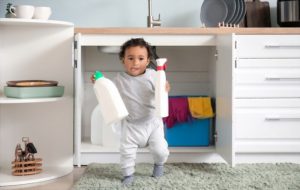Child Safety Week is run by Child Accident Prevention Trust (CAPT) to raise awareness of the risks of child accidents and how they can be prevented. This year it takes place between 7th and 13th June 2021.
When looking up information about common accidents in the home it can be quite alarming, and you do wonder how you have even survived the day with all the possible incidents that could occur. Although it can be easy for some to pass concerns about potential accidents in the home off as ‘health and safety gone made’, CAPT reminds us:
“Accidents are a part of growing up… right!?
Many are. Children need to explore and experiment. And minor scrapes and bruises are part of an active, healthy childhood. But some children suffer the pain of serious accidents that can alter the course of their lives forever and tear families apart. The pain and the guilt can last for years, if not a lifetime.
The majority of these serious accidents are completely preventable. And the solution is often something simple that takes a moment or can become part of our everyday routines.”
(capt.corg.uk, 2021)
 As a foster carer you are caring for vulnerable children and young people who will need you to provide a safe environment, but without making life in your home too unadventurous and boring, it is important to take precautions taken to minimise risks where possible.
As a foster carer you are caring for vulnerable children and young people who will need you to provide a safe environment, but without making life in your home too unadventurous and boring, it is important to take precautions taken to minimise risks where possible.
To be able to support you to create and maintain a safe home in terms of physical safety and accident prevention; during the foster carer assessment process, and regularly once approved to foster, foster carers have:
A ‘Health & Safety’ check on their home which includes fire precautions and fire escape plan, first aid provisions, appliance safety, storage of medications/ cleaning products, car seats, etc
A Pet Assessment to ensure that any pets in the home are well cared for and safe to be around children.
If you are already fostering with UK Fostering then you can refer to your Foster Carer Handbook and our Health & Safety Policy as there is advice and guidance in both on the expectations of UK Fostering in this regard. You can of course also speak with your Supervising Social Worker!
There is obviously much more to consider in terms of a positive, safe home environment for children, but hopefully the resources sections below will enable you better ‘accident-proof’ your home.
Resources
https://www.capt.org.uk/Pages/Category/child-safety-week – Child Accident Prevention Trust website with lots of information on child safety and accident prevention including helpful factsheets also translated into Urdu, Bengali, Panjabi, Polish and Arabic.
by Lynsey Dobbs – Senior Recruitment Officer, UK Fostering
